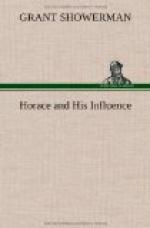To appreciate this better, we must return to the theme of Horace’s personal quality. We have already seen that in no other poet so fully as in Horace is the reality of personal contact to be felt. The lyrics, as well as the Epistles and Satires, are almost without exception addressed to actual persons. So successful is this attempt of the poet to speak from the page that it needs but the slightest touch of imagination to create the illusion that we ourselves are addressed. We feel, as if at first hand, all the qualities that went to make up Horace’s character,—his good will, good faith, and good-nature, the depth and constancy of his friendship, his glow of admiration for the brave deed, the pure heart, and the steadfast purpose, his patient endurance of ill, his delight in men and things, his affection for what is simple and sincere, his charity for human weakness, his mildly ironical mood, as of one who is aware that he himself is not undeserving of the good-humored censure he passes on others, his clear vision of the sources of happiness, his reposeful acquiescence, and his elusive humor, which never bursts into laughter and yet is never far away from it. We are taken into his confidence, like old friends. He describes himself and his ways; he lets us share in his own vision of himself and in his amusement at the bustling and self-deluded world, and subtly conciliates us by making us feel ourselves partakers with him in the criticism of life. There is no better example in literature of personal magnetism.
And he is more than merely personal. He is sincere and unreserved. Were he otherwise, the delight of intimate acquaintance with him would be impossible. It is the real Horace whom we meet,—not a person on the literary stage, with buskins, pallium, and mask. Horace holds the mirror up to himself; rather, not to himself, but to nature in himself. Every side of his personality appears: the artist, and the man; the formalist, and the skeptic; the spectator, and the critic; the gentleman in society, and the son of the collector; the landlord of five hearths, and the poet at court; the stern moralist, and the occasional voluptuary; the vagabond, and the conventionalist. He is independent and unhampered in his expression. He has no exalted social position to maintain, and blushes neither for parentage nor companions. His philosophy is not School-made, and the fear of inconsistency never haunts him. His religion requires no subscription to dogma; he does not even take the trouble to define it. Politically, his duties have come to be also his desires. He will accept the favors of the Emperor and his ministers if they do not compromise his liberty or happiness. If they withdraw their gifts, he knows how to do without them, because he has already done without them. He conceals nothing, pretends to nothing, makes no excuses, suffers from no self-consciousness, exercises no reserve. There are few expressions of self in all literature so spontaneous and so complete. Horace has left us a portrait of his soul much more perfect than that of his person. It is a truthful portrait, with both shadow and light.




